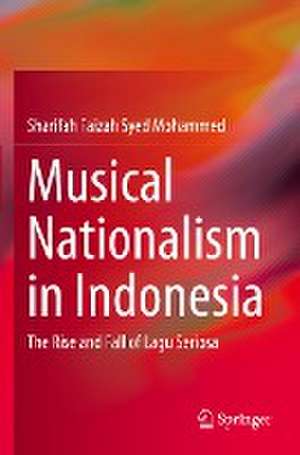Musical Nationalism in Indonesia: The Rise and Fall of Lagu Seriosa
Autor Sharifah Faizah Syed Mohammeden Limba Engleză Paperback – 21 mar 2022
| Toate formatele și edițiile | Preț | Express |
|---|---|---|
| Paperback (1) | 726.61 lei 6-8 săpt. | |
| Springer Nature Singapore – 21 mar 2022 | 726.61 lei 6-8 săpt. | |
| Hardback (1) | 732.04 lei 6-8 săpt. | |
| Springer Nature Singapore – 21 mar 2021 | 732.04 lei 6-8 săpt. |
Preț: 726.61 lei
Preț vechi: 886.12 lei
-18% Nou
Puncte Express: 1090
Preț estimativ în valută:
139.04€ • 145.46$ • 115.50£
139.04€ • 145.46$ • 115.50£
Carte tipărită la comandă
Livrare economică 02-16 aprilie
Preluare comenzi: 021 569.72.76
Specificații
ISBN-13: 9789813369528
ISBN-10: 9813369523
Ilustrații: XXXI, 234 p. 32 illus., 7 illus. in color.
Dimensiuni: 155 x 235 mm
Greutate: 0.42 kg
Ediția:1st ed. 2021
Editura: Springer Nature Singapore
Colecția Springer
Locul publicării:Singapore, Singapore
ISBN-10: 9813369523
Ilustrații: XXXI, 234 p. 32 illus., 7 illus. in color.
Dimensiuni: 155 x 235 mm
Greutate: 0.42 kg
Ediția:1st ed. 2021
Editura: Springer Nature Singapore
Colecția Springer
Locul publicării:Singapore, Singapore
Cuprins
Chapter 1 Introduction.- Chapter 2 The Art Song as a National Symbol.- Chapter 3 The Rise and the Decline of Lagu Seriosa.- Chapter 4 Case studies.- Chapter 5 Lagu Seriosa in Indonesian Nationalism. Chapter 6 Conclusion.
Notă biografică
Sharifah Faizah Syed Mohammed is Associate Professor of Music at Universiti Teknologi MARA in Malaysia. She completed her Ph.D. at Monash University. She holds a Master of Arts in Performance Studies from City University, London, and The Guildhall School of Music and Drama, and a Bachelor of Arts in Music (Hons.) from Bath Spa University. Her research focuses on performance practice, performativity, the politics of song, music, identity and nationalism, specifically relating to the Malay and Indonesian Archipelago, and Southeast Asia more widely.
Textul de pe ultima copertă
This book charts the growth of the Indonesian nationalistic musical genre of lagu seriosa in relation to the archipelago's history in the 1950s and 1960s, examining how folk songs were implemented as a valuable tool for promoting government propaganda. The author reveals how the genre was shaped to fit state ideologies and agendas in the Sukarno and Soeharto eras. It also reveals the very significant role played by Radio Republik Indonesia in the genre’s development and dissemination. Little research has been done to investigate how Indonesian music contributed to nation-building during Indonesia’s immediate post-colonial period. Emulating the European art song, the genre was adapted to compose songs with the purpose of promoting a strengthened collective Indonesian identity, fostered by a group of musicians who functioned as gatekeepers, monitoring and devising various mechanisms for songs to conform to the propagandistic needs of the Indonesian government at the time. The resultwas the development of classical style of singing and the cultivation of a patriotic collection of music during the Guided Democracy period (1959–1965), which peaked at the height of the Konfrontasi (1963–1966). Lagu seriosa lost popularity as popular music infiltrated Indonesia in the 1970s, but it remains an iconic yet understudied aspect of the nationalistic agenda in Indonesia. The case studies of selected songs reflected continuity and change in musical style and over time. This book is of interest to scholars studying the intersection between history, politics, identity, arts and cultural studies in Indonesia. It is also of interest to researchers investigating the role of music in identity formation and nation-building more widely.
Caracteristici
Provides a new perspective on Lagu Seriosa in relation to the development of Indonesian nationalism in the postcolonial period Proposes constructive ideas on how to preserve this genre of Indonesian music for it to endure in the contemporary imagination Presents a unique interdisciplinary intersection between Indonesian history, politics, arts, and cultural studies
